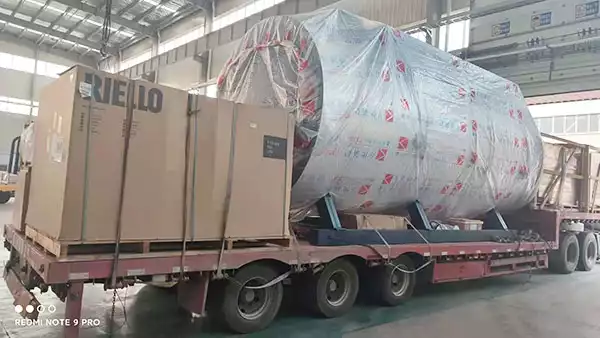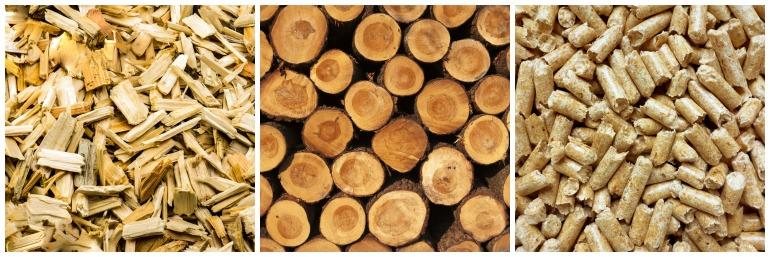biomass boiler guide : industrial biomass boiler cost
Industrial biomass boilers can cost around $10,000 – $100,000, depending on biomass boiler capacity, efficiency, brand, and other factors. A biomass boiler is a system that produces heat and energy, but instead of using natural gas or other fossil fuels, energy is produced by burning biomass. Biomass boiler fuel types include agricultural, forest, urban and industrial residues. Compared to fossil fuels, this waste is used to generate heat and electricity with less impact on the environment.
A biomass boiler system can convert biomass into energy through a few different processes. The most common method for industrial biomass boilers is direct combustion, where biomass burns, releasing heat that can warm buildings, heat water, or generate electricity via steam turbines. Additionally, biomass boilers can use thermochemical processes to create a liquid or gaseous fuels like renewable diesel, methane, or renewable jet fuel.
What is industrial biomass boiler?
industrial biomass boiler
Biomass is the organic matter that can be used as fuel. It includes wood, wood chips, pellets and nut shells. Biomass can be burned to generate heat or electricity. The process of burning biomass to generate energy releases carbon dioxide (CO2) and other greenhouse gases into the atmosphere. Biomass also releases particulate matter that can negatively affect air quality in communities around industrial biomass boilers.
Biomass is different from fossil fuels like coal and oil because it comes from living organisms rather than ancient ones (which have been buried for thousands of years). Biomass has a lower carbon content than fossil fuels because it doesn’t contain any fossilized carbon—it’s made entirely of living materials instead!
Need a new boiler?
How does an industrial biomass boiler work?
biomass boiler system
An industrial biomass boiler works by burning a renewable fuel, such as wood chips or corn stalks, to produce steam. The steam is then used to drive a turbine and generate electricity. Alternatively, the heat from the boiler can be stored for later use in other applications like heating homes or offices.
Biomass boilers are typically smaller than coal or oil-fired boilers and can be installed in homes, offices and other buildings. A biomass boiler is a great option for anyone who wants to reduce their reliance on traditional fossil fuels while also generating renewable electricity.
How much does a biomass boiler cost?
biomass boiler cost
Biomass boilers are designed to heat your home, so the price of one is largely dependent on how much heating capacity you need. The price can be anywhere from $10,000 to $100,000 (or more). The type of biomass fuel you use will also affect the cost. If you have access to wood chips and other biomass fuel sources in large quantities and can afford to burn these fuels all day long without interruption, then you won’t have to pay much for your boiler system—you’ll only pay for labor costs and installation fees.
If you want a system that’s more efficient at generating energy than burning wood chips alone, however, consider adding solar panels or storage batteries as part of your setup. These technologies will make it possible for them to run independently when necessary but still draw power from their usual source whenever possible; this will help save money by reducing electricity bills during summer months when sunlight is plentiful but temperatures aren’t quite warm enough yet outside
Get FREE Boiler Quotes
- ✔Get FREE Local Boiler Quotes today
- ✔Compare The Best Prices
- ✔Save Money On Your New Boiler Today!
What are the disadvantages of industrial biomass boilers?
installing a biomass boiler
While industrial biomass boilers have a number of advantages, there are also some disadvantages. The biggest drawback is cost, which can be prohibitive. For example, installing an industrial biomass boiler costs anywhere between $7,000 and $30,000 per ton of wood fuel burned (depending on the type of system).
Additionally:
- They are expensive to operate. Industrial biomass boilers use large amounts of fuel and they require regular maintenance by qualified personnel. Furthermore, these types of systems tend to be inefficient compared to other heating methods because they generate fewer BTUs per pound than natural gas or propane-fueled furnaces do—resulting in higher utility bills for consumers who opt for this type of heating system over another one that’s more cost effective for their needs.

biomass boilers cost
Is a industrial biomass boiler worth it?
The environmental and financial benefits of a biomass boiler can be decisive in the decision-making process, but they shouldn’t be the only factors. For example, if your application needs to run 24 hours a day, seven days a week (like at a factory or warehouse), then a gas-fired boiler may offer greater flexibility in terms of being able to shut down overnight when demand is low. On the other hand, if you need to maintain consistent temperatures throughout your facility as part of your production process (e.g., an industrial bakery), then using steam from an industrial biomass boiler might be better suited for this purpose than using hot water from a central heating system that would require significant modifications to support different levels of temperature control.
The bottom line? The answer depends on what works best for you given all possible scenarios!
What is the best biomass fuel?
There are several renewable fuel sources that you can use to power your biomass boiler. Biomass fuels are a great alternative to fossil-fueled heating systems for homes and businesses because they’re renewable, easy to acquire, and don’t require the use of chemicals or greenhouse gases. In fact, if you choose wood chips as your main feedstock, you’ll even be helping out the environment by reducing carbon dioxide emissions!
Here’s a list of some common biomass fuels:
- pellets (made from compressed sawdust)
- woodchips (coarsely shredded)
- biomass pellets (compressed sawdust or bark shavings)

wood fuel
Is a biomass boiler cheaper than gas?
- Is a biomass boiler cheaper than gas?
The answer to this question depends on the fuel source and the boiler efficiency. In many cases, biomass boilers are more cost-effective than gas because they use waste products that would otherwise go to landfill. While you’ll need to research your own circumstances carefully when comparing these two heating systems, it’s worth noting that the cost of a biomass boiler is much lower than a gas boiler.
Conclusion
If you want to start burning biomass, you should consider whether it’s worth the investment. Industrial biomass boilers can be expensive but can save you money in the long run if they’re used correctly. You also need to think about how much energy your business needs before deciding whether or not installing a biomass boiler is right for you. If so, then our experts would love to talk with you about the best way forward!

Looking for boilers with sophisticated manufacturing, great quality?
Fangkuai boiler can always provide what you want.


